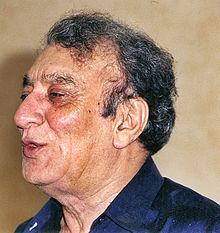Ahmad Faraz
Ahmed Faraz | |
|---|---|
 Ahmad Faraz, in Toronto 2005 | |
| Native name | احمد فراز |
| Born | Syed Ahmad Shah Ali 12 January 1931 Kohat, NWFP, British India (now Khyber Pakhtunkhwa, Pakistan) |
| Died | 25 August 2008 (aged 77) Islamabad, Islamabad Capital Territory, Pakistan |
| Pen name | Faraz Urdu: فراز |
| Occupation | Urdu Poet, Lecturer |
| Nationality | Pakistani |
| Citizenship | Pakistani |
| Education | Urdu literature M.A Persian literature M.A |
| Alma mater | Edwardes College, University of Peshawar |
| Period | 1950–2008 |
| Genre | Urdu Ghazal |
| Subject | Romance, Politics, Resistance |
| Literary movement | Democratic Movement |
| Notable awards | Sitara-i-Imtiaz Hilal-e-Imtiaz Hilal-e-Pakistan Nigar Awards |
| Children | Saadi, Shibli Faraz and Sarmad Faraz |
Syed Ahmad Shah (Urdu: سید احمد شاہ), better known by his pen name Ahmed Faraz, (Urdu: احمد فراز 12 January 1931 – 25 August 2008)[1][2][3] was a Pakistani Urdu poet, scriptwriter and chairman of Pakistan Academy of Letters. He wrote his poetry under pseudonym Faraz.[a] During his lifetime, he criticised military rule and coup d'état in the country and was displaced by the military dictators.[4] He was awarded the Sitara-i-Imtiaz and Hilal-e-Imtiaz. On 25 August 2008, he died in Islamabad, and later Government of Pakistan conferred Hilal-e-Pakistan posthumously upon Faraz for his contribution to poetry and Urdu literature.[5][6]
Early life[]
Faraz was of Syed background.[7] His brother is Masood Kausar, an ex Governor of KP. Faraz moved to Peshawar with his family. He studied at Edwardes College, Peshawar and received his Master's degree in Urdu and Persian from Peshawar University.[1] During his college life, the two prominent poets Faiz Ahmad Faiz and Ali Sardar Jafri influenced him and became Faraz's role models.[6]
Literary work[]
Faraz began his poetry career during his college life with the Tanha Tanha ghazal collection. Love and beauty were the main themes of his poetry. His poems were used by the singers, including Mehdi Hassan who sung Ranjish he sahi ghazal. His poem Silsilay Tor Gaya was sung by Noor Jahan. Faraz is credited for writing renowned poems, including Pas Andaaz, Sab Awazain Meri, Khuwab Gul, Janan Janan, and Ghazal Bahana Karon.[8]
Career[]
Ahmad Faraz's poetry was highly popular among the general public in Pakistan, India as well as among the subcontinent's immigrant populations overseas. He was a poet in high demand at social gatherings (mushairas) where he would recite his poetry in his own voice. Ahmad Faraz was often compared to Muhammad Iqbal and Faiz Ahmed Faiz.
Singers like Mehdi Hasan, Ghulam Ali, Jagjit Singh and Runa Laila greatly popularized his poetry by singing his ghazals in films and in concerts.[1]
Ahmad Faraz served as Chairman of the National Book Foundation in Islamabad, Pakistan.[9]
Political activity[]
Faraz was arrested for writing poems that criticised military rulers in Pakistan during the reign of General Zia-ul-Haq. Following that arrest, he went into a self-imposed exile.[4] He stayed for 6 years in Britain, Canada, and Europe before returning to Pakistan, where he was initially appointed as Chairman of the Pakistan Academy of Letters and later chairperson of the Islamabad-based National Book Foundation for several years. He has been awarded numerous national and international awards. In 2006, he returned the Hilal-e-Imtiaz award he was given in 2004.[1]
Death and legacy[]

Earlier in 2008, after a fall in Baltimore, Maryland, there were false rumors of his death while he was being treated in a Chicago hospital. But he was able to return to his homeland, Pakistan. Then later, Ahmad Faraz died of kidney failure, confirmed by his son Shibli Faraz, in a private hospital in Islamabad on 25 August 2008. His funeral was held on the evening of 26 August, among many admirers and government officials at H-8 Graveyard, Islamabad, Pakistan.[1][10]
Ahmad Faraz is highly regarded among the long list of revolutionary poets of Urdu language.[11]
See also[]
References[]
- ^ Jump up to: a b c d e Haresh Pandya (1 September 2008). "Ahmed Faraz, Outspoken Urdu Poet, Dies at 77". The New York Times. Retrieved 22 May 2019.
- ^ "Tribute to a legend: Remembering Ahmed Faraz". The Express Tribune. Karachi, Pakistan. 12 January 2015., Retrieved 28 January 2016
- ^ "About Faraz". Ahmad Faraz Trust. Archived from the original on 6 February 2016. Retrieved 28 January 2016.
- ^ Jump up to: a b "Interview in Urdu language سلسلے توڑ گیا وہ سبھی جاتے جاتے". BBC News. 26 August 2008. Retrieved 22 May 2019.
- ^ "Hilal-e-Pakistan for Ahmed Faraz". The Nation. Pakistan. 11 November 2010. Retrieved 22 May 2019.
- ^ Jump up to: a b "Faraz dies: Poetry loses a voice, people a friend". 26 August 2008.
- ^ "Ahmed Faraz remembered". The Nation. 26 August 2014. Retrieved 3 August 2020.
- ^ "Remembering Ahmed Faraz, on his sixth death anniversary". 25 August 2014.
- ^ "AhamadFarazTrust.org". 6 February 2016. Archived from the original on 6 February 2016.
- ^ "Ahmad Faraz laid to rest". Gulf News. 26 August 2008. Retrieved 28 January 2016.
- ^ "Remembering Ahmad Faraz". outlookindia.com. 11 September 2008. Retrieved 13 April 2020.
Notes[]
- ^ Takhallus is a pseudonym, fictitious or a pen name used by the Urdu or Persian speaking people when they performs a particular social or cultural role such as poetry etc.
- Ahmad Faraz
- People from Kohat District
- Pashtun people
- Urdu-language poets from Pakistan
- Urdu-language poets
- Ghazal
- Nigar Award winners
- Recipients of Hilal-i-Imtiaz
- Recipients of Sitara-i-Imtiaz
- Pakistani Sunni Muslims
- University of Peshawar alumni
- 1931 births
- 2008 deaths
- People from Islamabad
- Pakistani progressives
- Deaths from kidney failure
- 21st-century Urdu-language writers
- 20th-century Urdu-language writers
- Urdu-language theologians
- 20th-century poets
- Edwardes College alumni